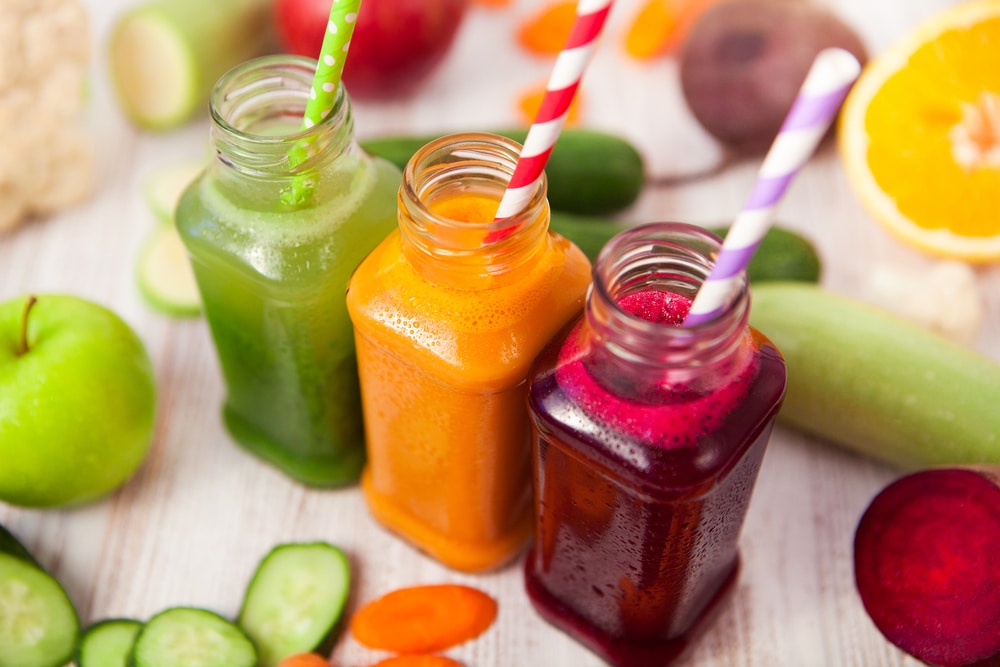You’re feeling sluggish, bloated, and have been running on low energy for weeks. Your friend has the perfect solution for you – go on a 3-day cleanse diet that will flush your body of all the toxins. All you have to do is drink some juice or herbal tea, and everything’s fixed.
Before you run to the grocery store for juicing ingredients, there’s something you need to know. Your body doesn’t need a 3 day juice cleanse diet. Don’t get wrapped in marketing gimmicks trying to sell you powders and teas – here’s what science says about toxins in your body and how to get rid of them.
Does Your Body Have Toxins?
Toxins are chemicals like heavy metals (lead), pesticides, or waste products from metabolism inside your body like ammonia. They can come from both external sources and internal sources; the difference being where they originate from (2).
It’s possible to have toxins from external sources, like household cleaners or pollution in the air that you breathe in. However, most of these are removed by your liver and/or kidneys, and are excreted through urine.
It’s also possible for toxic substances to build up inside of your body. This usually happens because they’re not broken down and used as nutrients and energy, which can lead to different types of diseases such as cancer and liver problems.
What Is The 3-Day Body Cleanse Detox Diet?
A “detox” is when a person temporarily stops consuming certain foods for anywhere from 3 days to several weeks – sometimes even longer. During this time, you’re supposed to avoid or drastically reduce your intake of things like alcohol, certain foods containing gluten and preservatives, excess caffeine, sugars, etc.
While some people rely on detoxes as a way to lose weight and feel better about themselves for a short period of time, they don’t work in the long term; if they did we wouldn’t have an obesity epidemic!
Detox diets may also include daily exercise, which is actually one of the best ways to naturally get rid of toxins through sweat – remember that next time you wake up feeling tired from a night out on the town.
A “cleanse” is similar; however, it doesn’t necessarily involve eating just juice or teas. Someone going on a cleanse may replace one meal a day with juice, but eat food for the other two meals. Other forms of cleansing are fasting for a day, or eating only organic foods for several days to get rid of the bad “chemicals” that supposedly came from pesticides and herbicides used in normal farming practices. The idea is similar to detoxes – you want to eliminate all these toxins from your body by not eating certain things!
Read More: 3-Day Detox Diet: Does Your Body Really Need Cleansing?
What Are The Benefits Of The 3-Day Detox Cleanse Diet?
Proponents of the 3-day cleanse diet meal plan argue that it has two major benefits, for which there is no scientific proof.
Weight Loss
There’s no evidence that shows cleanses help you lose weight in the long term. For short-term effects, they do work because your body will be flushing out water weight and excess sodium from an empty stomach. As your body removes extra fluid and salts, you might feel lighter and less bloated for several days after finishing a detox or cleanse. This will reverse once you start eating normally again.
Get Rid Of Toxins
A cleanse claims to purify your body and get rid of harmful substances. There is no scientific proof of this. Furthermore, your body is perfectly capable of “cleansing” itself. It does so with the help of an extensive system made up of the following organs:
- Skin – Your skin is a one-way protection system – it protects your internal organs by ensuring nothing gets into your body.
- Lymphatic System – This system of vessels and nodes is your main purification agent. The lymphatic fluid absorbs toxins, which are then passed from the body through urine or feces.
- Liver – The liver gets all the credit for being our main detox center. A liver can metabolize a specific amount of toxins. The rest are passed to the kidneys for detoxification, or to the skin and lungs where they are excreted through perspiration and oxygenation.
- Kidneys – Your kidneys perform a similar function as your liver: They filter out toxic waste and send it to your bladder via urine.
- Respiratory system – Your nose, and lungs provide you with a means to expel harmful substances from the body. Dust particles breathed in are trapped through the hairs in the nose. Mucus also helps to expel more unwanted particles.
If you struggle to even flirt with the idea of giving up your favorite foods or working out till your legs give way – BetterMe app is here to breathe a fresh perspective into the way you view the weight loss process! Check out the app and experience the fun side of fitness and dieting with BetterMe!
A Cleanse May Do More Harm Than Good
The reason cleanses don’t work in the long-term is that they’re not filling. You’re missing some of the essential nutrients your body needs to function properly, such as proteins to repair the damage done by exercise or stress, amino acids for muscle growth/repair, healthy fats, good carbohydrates, fiber, etc.
Fasting may also make your metabolism slower so that when you start eating normally again you’ll be storing more fat than before (5). It’s like trying to run a car without gas. You might have driven it for a while, but eventually, you will need something to keep the engine running!
What To Do Instead Of Going On A 3-Day Diet Cleanse
Before you get on a detox, try to find the root cause of your symptoms. In most cases, your symptoms can be alleviated by a diet and/or lifestyle change. Here are some reasons why you may feel you need a detox, and solutions for each.
Why Do I Feel Sluggish?
Fatigue is a common symptom of several conditions and serious diseases, but in most cases, it is caused by simple lifestyle factors. Here are some of the potential reasons why you’re always tired:
High Stress Levels
Our bodies react to stress by releasing adrenaline and cortisol, which help us cope with the situation. However, these hormones are powerful stimulants that eventually wear down our systems if they’re constantly producing at a high level (1).
Fatigue As A Side Effect Of Medications
Some medications can make you feel tired or out of it (3). For example, sleeping pills make patients drowsy due to the fact that their bodies aren’t getting enough sleep. If you suspect a prescription medication is causing your fatigue, consult with your doctor in order to find an alternative therapy that won’t affect how active you feel throughout the day.
Exhaustion From Lack Of Sleep
While we need only 7 to 8 hours of sleep each night for healthy living, many people have a hard time getting enough rest. Some people don’t get to sleep on time due to a jam-packed work or school schedule, while others fall asleep late at night. Sleep is essential for the body and the mind because it allows us to refresh our minds and re-energize our bodies, which in turn helps us stay active throughout the day (4).
Read More: Weight Loss Detox: Should You Be Buying Into The Hype Of Detox Diets?
Poor Nutrition Habits
A diet that’s too low in calories can make you feel sluggish and weak (3). Furthermore, if you’re not eating regularly during the day (specifically breakfast), your body doesn’t have everything it needs to function optimally. You may also feel sluggish if you’re lacking vitamins, minerals, proteins, carbohydrates, fats or water in your system.
Allergies
Some people feel tired, sluggish and itchy all over because they have an allergy. If you get itchy eyes, sneezing or a runny nose when you’re outside, check with your doctor to see if allergies are the cause of your fatigue (3).
Hyperthyroidism
If you’re always feeling heated up (hot flashes), fatigued or out of breath, it could be a sign you have hyperthyroidism . This condition causes the thyroid gland to produce excessive amounts of hormones that can lead to heart palpitations and emotional problems. If hyperthyroidism is diagnosed properly and treated properly, you should begin noticing improvements in your symptoms.
Exhaustion From Lack Of Exercise
If you don’t exercise on a regular basis, you won’t feel as alert and energetic as those who do. According to the American College of Sports Medicine, 30 minutes of moderately intense aerobic activity 5 days a week plus strength training twice per week can help adults maintain optimum energy levels. In order to keep yourself energized throughout the day, try walking for thirty minutes every morning or afternoon. It will make a dramatic difference in how active and energetic you feel during your waking hours.
Why Do I Feel Bloated?
There are many reasons why you could be experiencing ongoing bloating. The list below may help identify some of the causes that are occurring for you:
Food Allergies And Intolerances
Many people find they have a sensitivity to wheat, gluten grains or dairy products which can cause bloating and flatulence. Wheat is probably one of the most common culprits as it is in so many different foods in our diet these days.
Other intolerances include: lactose intolerance; fructose sensitivity (occurs in some people who have either a hereditary intolerance or malabsorption); and wheat; soy; or corn sensitivity. If you think you have a food sensitivity, discuss it with your healthcare provider. Usually, when you avoid these foods, your symptoms will subside over time.
Whether you’re a workout beast or just a beginner making your first foray into the world of fitness and dieting – BetterMe has a lot to offer to both newbies and experts! Install the app and experience the versatility first-hand!
High FODMAP Diet
Reviewing your food intake and looking into the amount of foods that contain high levels of FODMAPS can help determine what foods may be causing upset in your body. If you have a sensitivity to them, a low fermentable oligosaccharide, disaccharide, monosaccharide and polyol (FODMAP) diet may be helpful for relief of bloating. Ask your doctor or dietitian if and how you should follow a low FODMAP diet to see if it helps ease the symptoms of IBS which include: gas; abdominal pain; bloating; diarrhea or constipation.
Bloating And Carbohydrate Intolerance (Non Celiac Gluten Sensitivity)
Certain carbohydrates are difficult for some people to digest properly due to their inability to produce sufficient amounts of an enzyme called amylase (6). These carbs also include FODMAPS which are indigestible sugars found in fruit, vegetables and grains: fructose; fructans and galactans.
Common foods that may cause this include wheat; dairy products; beans and cruciferous vegetables like broccoli, cabbage, cauliflower and Brussels sprouts. You can also have milder reactions to these types of carbs by eating them in high doses or infrequently.
Many Medicines
One of the more common medications that is known for causing bloating includes aspirin or other NSAIDS (nonsteroidal anti-inflammatory drugs). Other medicines that may be a culprit include antibiotics including tetracycline; digoxin (heart medication); iron pills; levothyroxine (thyroid hormone) and metformin tablets used to treat type 2 diabetes.
Always review with your doctor any medications you are taking so they can help identify whether the medications you’re taking could be causing your bloating.
Overeating
Eating too much or eating very quickly can cause bloating as well. When we overeat, food moves too rapidly through our stomachs and small intestines causing digestive problems such as gas; abdominal pain; cramps; bloating; diarrhea and constipation.
Eating slowly allows your body to digest the foods you’re consuming resulting in less gastrointestinal discomfort. Also, try to eat smaller meals throughout the day rather than 3 big ones if you’re finding that you are experiencing symptoms like bloating.
Bacterial Overgrowth In The Small Intestine
Bacteria normally exist in the small intestine and should only cause problems if they grow too much. This isn’t common but can occur after gastrointestinal surgery or with some conditions.
Probiotics are a type of beneficial bacteria that may help to prevent this overgrowth from occurring, but it’s always best to talk with your doctor first before taking them as different individuals have varying levels of tolerance for these products.
The Bottom Line
A 3-day diet may seem like a quick solution for bloating, sluggishness and any other symptoms you experience that make you think your body is full of toxins. However, it’s inefficient and potentially harmful. What you should do is find the cause of your symptoms then change your diet and lifestyle to feel better.
Get your personalized
meal plan!
DISCLAIMER:
This article is intended for general informational purposes only and does not address individual circumstances. It is not a substitute for professional advice or help and should not be relied on to make decisions of any kind. Any action you take upon the information presented in this article is strictly at your own risk and responsibility!
SOURCES:
- Association of fatigue to work-related stress, mental and physical health in an employed community sample (2017, nih.gov)
- Effects of the Dietary Detoxification Program on on Serum y-glutamyltransferase, Anthropometric Data and Metabolic Biomarkers in Adults (2016, nih.gov)
- Fatigue in Older Adult (2019, nih.gov)
- Impact of sleep debt on metabolic and endocrine function (1999, nih.gov)
- INTERMITTENT FASTING AND HUMAN METABOLIC HEALTH (2015, nih.gov)
- Why Do I Feel Bloated? Common Causes of Bloating – What To About It (2020, pennmedicine.org)














